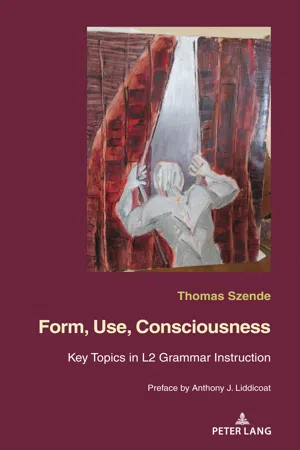
Form, Use, Consciousness
Key topics in L2 grammar instruction With a Preface by Anthony J. Liddicoat (Professor of Applied Linguistics, University of Warwick)
- English
- PDF
- Available on iOS & Android
Form, Use, Consciousness
Key topics in L2 grammar instruction With a Preface by Anthony J. Liddicoat (Professor of Applied Linguistics, University of Warwick)
About this book
Every language universe is both close to and far removed from our own. In a way, learning a foreign language is like not getting off at our usual stop and staying on the bus until we arrive at the terminal. The unfamiliar neighborhoods we discover are both similar to and different from what we know. Learners tackle an L2 using a variety of experiences acquired in their L1, and this new language system works as part of a network of previously existing grammar models and social categories.
The purpose of this book is not to revisit the pros and cons of teaching grammar. Learning an L2 appears as the gradual ability to realize which language features to select and prioritize to express a particular idea. Speaking in any L2 requires specific tools, and describing reality through new linguistic means involves a mental restructuring to which learners—particularly adults and older adolescents—are sometimes resistant. Indeed, not all information produced in an L2 and disclosed to the learners will necessarily be applied to language acquisition. If, by some miracle, this were the case, there would be no need for any reflection on the teaching and learning of grammar.
Frequently asked questions
- Essential is ideal for learners and professionals who enjoy exploring a wide range of subjects. Access the Essential Library with 800,000+ trusted titles and best-sellers across business, personal growth, and the humanities. Includes unlimited reading time and Standard Read Aloud voice.
- Complete: Perfect for advanced learners and researchers needing full, unrestricted access. Unlock 1.4M+ books across hundreds of subjects, including academic and specialized titles. The Complete Plan also includes advanced features like Premium Read Aloud and Research Assistant.
Please note we cannot support devices running on iOS 13 and Android 7 or earlier. Learn more about using the app.
Information
Table of contents
- Cover
- Copyright information
- Dedication
- Contents
- Preface
- 1. Foreword
- 2. Introduction
- 3. Language and Grammar
- 4. Grammar in the Classroom
- 5. Transposition and Metalanguage
- 6. Target Language Models
- 7. Use and Reuse
- 8. Grammar and Progression
- 9. Needs and Profiles
- 10. Rules and Exceptions
- 11. Error
- 12. Grammar and Vocabulary
- 13. Accuracy—Appropriateness
- 14. Discursive Practices
- 15. Getting into Grammar
- 16. Room for Reflection
- 17. Contrastive Analysis
- 18. Teaching Grammar Through Technology
- 19. Grammar and Communication
- 20. Afterword
- References